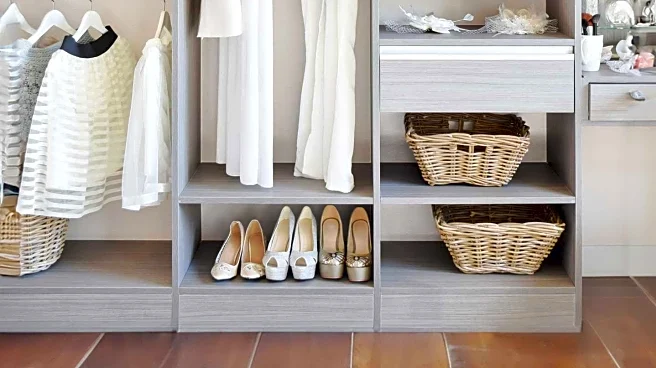What's Happening?
Professional organizers are offering insights into how they manage feelings of overwhelm when faced with cluttered spaces. Dina Smith, founder of Closet Therapy with Dina, acknowledges that even seasoned organizers can feel overwhelmed by clutter. Lisa Zaslow from Gotham Organizers explains that this feeling is a heightened form of stress, akin to the fight-or-flight response, but also includes a 'freeze' reaction. Organizers suggest various strategies to tackle clutter, such as clearing countertops, collecting trash, focusing on one category at a time, and assessing goals and resources. These methods aim to break down the overwhelming task into manageable steps, helping individuals regain control over their environment.
Why It's Important?
The advice from professional organizers is significant as it addresses a common issue faced by many individuals: managing clutter and the stress it induces. Clutter can lead to increased cortisol levels, particularly affecting women, and can disrupt mental clarity and productivity. By providing practical steps to tackle clutter, organizers help individuals reduce stress and improve their living conditions. This guidance is valuable for anyone looking to create a more organized and peaceful home environment, potentially leading to better mental health and overall well-being.
What's Next?
Individuals struggling with clutter can apply these strategies to their own spaces, starting with small, manageable tasks. Professional organizers suggest setting realistic goals and using time blocks to gradually address clutter. As people implement these methods, they may experience reduced stress and increased satisfaction with their living spaces. Additionally, the demand for professional organizing services may grow as more people seek expert assistance in managing their homes.
Beyond the Headlines
The approach to managing clutter also touches on deeper psychological aspects, such as the need for mindset adjustments and lowering expectations. Organizers emphasize the importance of changing internal messages to shift from feeling overwhelmed to being proactive. This highlights the connection between physical space and mental state, suggesting that organizing one's environment can lead to positive changes in mental health and self-perception.









